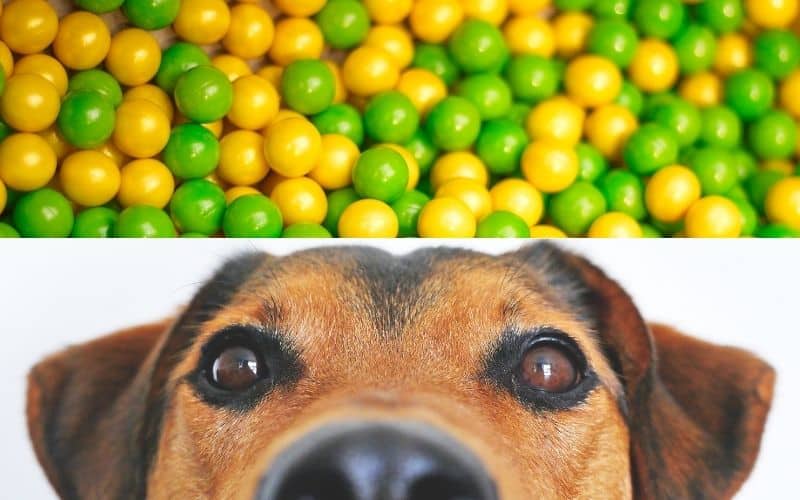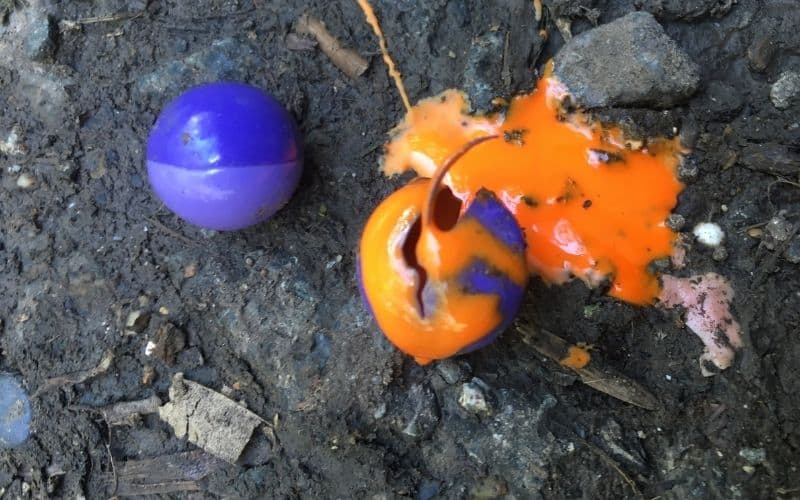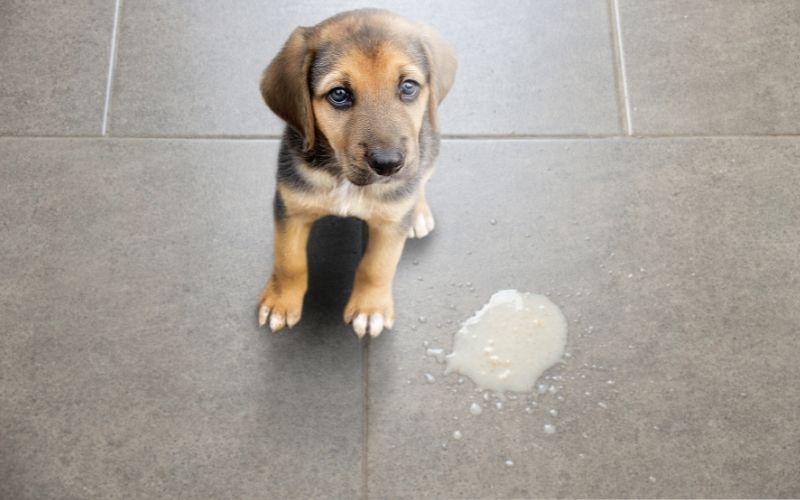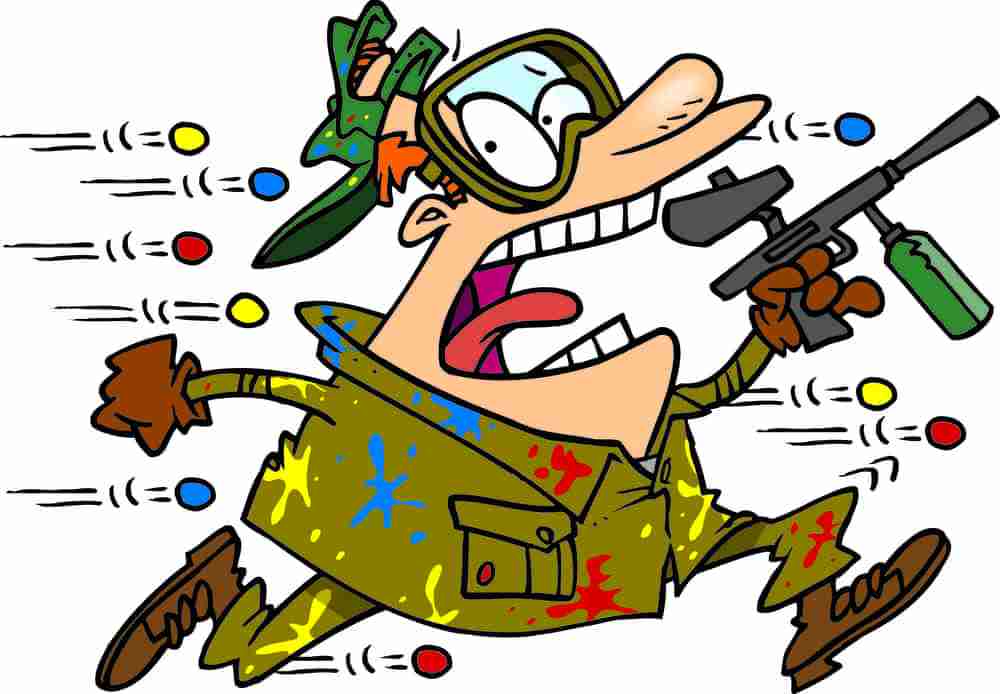Those who are into active and rugged sports can have a ton of fun paintballing. However, the game doesn’t come without its own set of hazards and risks.
People can get severely injured if they mishandle a serious firearm such as a paintball gun. But apart from people, paintballs can be lethal to animals too.

If you’re a pet owner who likes to go on a lot of paintballing adventures, you’ve probably asked yourself this question before:
Will paintballs hurt my dog?
In this article, we take a look at whether or not paintballs will hurt your dog (or other pets). Furthermore, we discuss what signs of paintball intoxication you need to watch out for, as well as what possible treatments may be administered to your dog.
Contents
Will Paintballs Hurt My Dog?
Generally speaking, paintballs can and will hurt your dog. Paintball guns are still considered powerful firearms. This is why plenty of states apply very strict regulations on them, to prevent harmful accidents from happening.
Are Paintballs Poisonous to Dogs?

It may come as a shock to plenty of dog owners to learn that paintballs can poison their furry friends. However, it’s one of the most common ways they harm dogs.
Here’s the low-down on what’s inside a paintball and why it can be poisonous to dogs.
Are Paintballs Safe to Eat?
After all, paintballs are strongly marketed as safe to ingest and made of food-grade components that aren’t harmful to the human body.
The outer layer of a paintball is made of gelatin and often wax. Meanwhile, the inner components are made of food-grade colorants. If a human were to accidentally consume a paintball, worst case scenario — they’ll get a really bad, bitter taste in their mouth.
So, why are paintballs toxic to dogs?
Why Paintballs Are Toxic for Dogs
Paintballs contain osmotically active ingredients that can be lethal to dogs.
Osmotically active ingredients can draw water out of one tissue and rapidly transfer it into another. Two osmotically active ingredients found in paintballs are glycerol and glycols.
Glycerol and glycols are often found in laxatives and cough syrups, and while they are completely harmless to humans, the same can’t be said for dogs.
When consumed by a dog, the glycerol and glycols in a paintball marker can quickly suck enormous volumes of water into the dog’s intestinal tract — causing a severe salt and electrolyte imbalance in the system.
This condition is known as “hypernatremia” and can cause blood vessel hemorrhage in the brain. If left untreated, hypernatremia can cause long-lasting and even lethal side effects for your dog.
Signs Your Dog Has Accidentally Eaten a Paintball
Dogs have a way of digging into things that they shouldn’t be digging into. No matter how carefully you store your paintballs at home, there will be some instances when your little furry friend will come across a stray pellet or two.
The key is to act fast and recognize the signs of paintball intoxication in dogs.
Here’s what you should look out for:
- Diarrhea
- Vomiting
- Unusually heavy panting
- Elevated heart rate
- Tremors and stumbling walking
- Hyperactivity
- Increased thirst and urination
- Depression
- Weakness or lethargy
- Blindness
- Seizures
- Coma

Signs of paintball intoxication may manifest anywhere between 30 minutes or 1 hour after ingestion. In some cases, dogs may also display signs of dehydration, especially if there’s been significant diarrhea and vomiting.
Common Treatments for Paintball Intoxication
Treatments vary depending on the severity of the condition. Continuous intravenous hydration therapy and anti-vomiting medicines may be used.
Enemas are also sometimes implemented to help paintballs move faster through the GI tract.

In other cases, medication is administered to treat seizures and/or lower pulse rates. Electrolyte alterations in the blood may also be closely monitored during the process.
Within 24-48 hours of treatment, 95% of pets can recuperate and return to normal. This is why it’s important that pet owners act fast and get their pets the right type of help immediately.
Can Paintballs Be Lethal?

The average velocity of a .68 caliber paintball is 280 feet (85.34 meters) per second. This amounts to a pellet traveling at 190 miles per hour (306 KPH).
If hitting a person with a paintball that’s traveling at this exact speed causes them to develop bruises, all while wearing protective armor and gear, the damage it can cause to a dog that’s not wearing any of these protections can be painful and lethal.
Accidentally shooting your dog can result in bruises, fractures, and even internal bleeding. If hit on the head, it may also cause blindness, permanent hearing loss, and concussion.
Smaller dogs as well as other smaller pets can get severely injured if shot with a paintball – the risk increases the smaller it gets. For instance, if a small dog is shot in the leg, it can cause fractured bones that may permanently affect its ability to walk and run.
Are Paintballs Biodegradable?
As mentioned earlier, paintball capsules are made of gelatin and sometimes wax — two natural elements that dissolve and break down over time. Therefore, in a sense, paintballs are biodegradable.

However, we can’t say the same about the paint that’s contained inside the paintball capsules.
Some paintballs, especially the ones that are made of cheap materials, take much longer to decompose. Meaning, they stay around longer than most paintballs.
These cheap paintballs (often referred to as “seconds”) are made of oil-based ingredients, which are harmful to the environment.
This is why it’s important that you only purchase paintballs from reliable and/or authorized sellers.
Conclusion
Besides physically harming your dogs and other pets, paintballs can also be toxic to them when ingested.
While there’s no way of preventing your dog from coming across a stray paintball marker at home or outside of the house, knowing what signs to look for can help you act fast and give your pet the proper care and attention he needs.
Always practice caution when playing with paintballs around your dog. Double or even triple-check equipment to make sure that they are out of reach and out of sight from your dog.